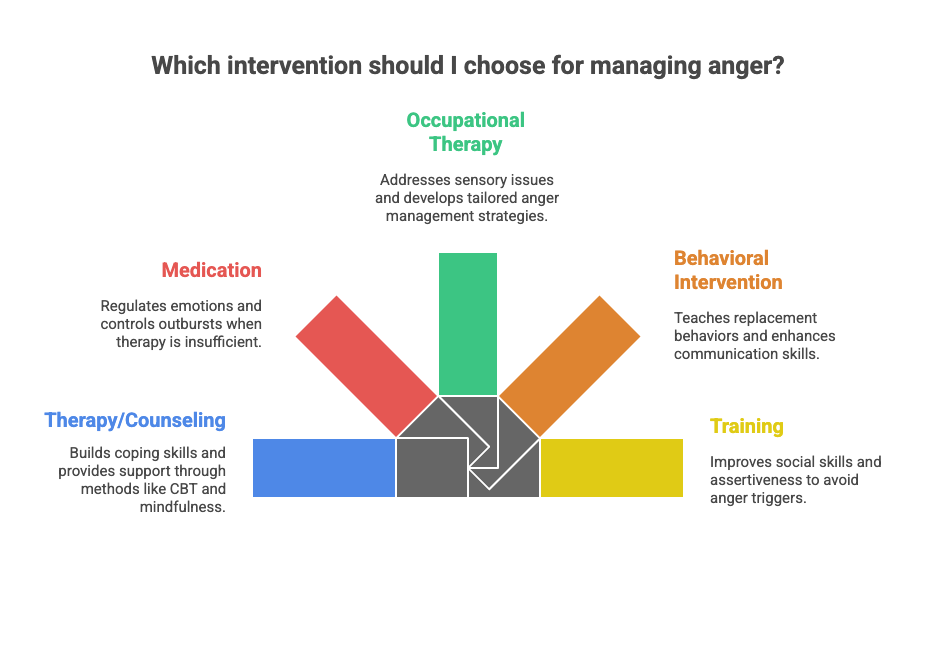Managing Anger in Adults with Autism: How to Deal with Autism Anger in Adults

Managing Anger in Adults with Autism — Start Here
If you’re searching for how to deal with autism anger in adults, you’re in the right place. Anger isn’t “bad behavior” — it’s a signal. For many autistic adults, spikes in anger are tied to sensory overload, communication breakdowns, unexpected changes, autistic burnout, or feeling misunderstood. This guide gives practical, neuro-affirming tools you can use today and frameworks that help long-term.
We’ll cover spotting personal triggers, building a simple prevention plan (routines, choices, scripts), in-the-moment de-escalation, aftercare that actually restores energy, and when professional support (CBT/DBT-informed work, OT for sensory regulation, or a meds conversation with a clinician) may help. Use what fits; leave what doesn’t. You deserve strategies that respect autonomy, reduce distress, and make daily life easier.
TL;DR (Quick Answer)
- Map triggers: Log situations, sensations, and patterns that precede anger (noise, heat, interruptions, abrupt changes).
- Prevent where possible: Stable routines, clear expectations, visual/time cues, and negotiated breaks.
- In the moment: Reduce input (quiet/dim), paced breathing (e.g., 4-in/7-hold/8-out), cold water splash, or a weighted item.
- Sensory kit: Ear defenders, cap or shades, chew/fidget, calming playlist; keep it reachable at home/work.
- Aftercare: Rehydrate, decompress (low-demand time), then reflect briefly on what helped without judgment.
- Long-term supports: Skills work (CBT/DBT-style emotion regulation), OT for sensory strategies, and talk to a clinician if anger ties to anxiety/depression or sleep issues.
- Safety first: If there’s risk of harm, follow your crisis plan and contact local emergency services.
Why Anger is Common for Adults with Autism
- Difficulty regulating emotions
- Sensory overload
- Rigid thinking
- Communication challenges
- Impulse control issues
- Co-occurring conditions
Common Anger Triggers for Autistic Adults
- Unexpected change
- Overstimulation
- Miscommunication
- Feelings of failure/embarrassment
- Physical discomfort
- Overload of demands
Healthy Ways for Autistic Adults to Manage Anger
- Self-awareness
- Avoidance
- Deep breathing
- Timeouts
- Physical exercise
- Progressive muscle relaxation
- Visualization
- Fidget items
- Positive self-talk
Getting Help for Managing Autism Anger
- Therapy/counseling
- Medication
- Occupational therapy
- Behavioral intervention
- Training
Anger is a normal human emotion that everyone experiences from time to time. However, for adults with autism spectrum disorder (ASD), anger can be incredibly challenging to manage. Difficulty regulating emotions is common for those on the spectrum. Additionally, sensory overload and rigid thinking can increase frustration. This frustration may manifest as anger or aggression. Difficulty communicating and lack of impulse control also contribute. While anger is not inherently problematic, how it is expressed can lead to relationship issues, accidents, or confrontations. Recognizing triggers, using coping strategies, and seeking support can help adults with autism gain greater control over their anger.
Why Anger is Common for Adults with Autism
There are several reasons anger issues tend to be more prevalent among adults on the autism spectrum:
- Difficulty regulating emotions – Individuals with ASD often struggle to appropriately identify, process, and modulate their emotions. Intense feelings like anger can spiral out of control rapidly.
- Sensory overload – Too much sensory input at once can cause a meltdown for autistic adults. Noises, lights, crowds, new places, etc., may lead to an angry outburst.
- Rigid thinking – Adults with ASD often engage in black-and-white thinking. This makes it hard for them to accept change, uncertainty, or transitions. Disrupting their routines can often trigger anger.
- Communication challenges – Many autistic adults have trouble expressing their feelings and needs. Frustration over not being understood can boil over into anger.
- Impulse control issues – Adults with autism may have difficulty controlling impulses and outbursts when angry. They may struggle to remain calm even if they want to. Executive functioning challenges play a role.
- Co-occurring conditions – Anxiety disorders, ADHD, depression, and other diseases often co-occur with ASD. This can further complicate emotional regulation abilities.
Common Anger Triggers for Autistic Adults
It’s essential for autistic adults and their loved ones to understand common triggers for anger outbursts:
- Unexpected change – Having plans suddenly changed or routines interrupted often causes autistic individuals severe stress that manifests as anger. Transitions between activities or locations can also be challenging.
- Overstimulation occurs when there is too much noise, light, smells, or crowds. This sensory input can overwhelm an autistic person’s nervous system. As a result, they may have a tantrum or outburst.
- Miscommunication – When an autistic individual’s words or actions are misunderstood, anger often results. Unclear instructions or expectations can also lead to anger. Direct, literal communication works best.
- Feelings of failure/ embarrassment – Messing up on a task can provoke strong anger in someone with ASD. Being reprimanded at work or criticized by family also affects them. Forgetting an essential item or appointment might trigger this response. Even minor mistakes can lead to strong anger due to perfectionism tendencies and low self-esteem.
- Physical discomfort can be caused by hunger, lack of sleep, gastrointestinal issues, or other physical problems. These issues may go unnoticed by the autistic person. They can put them on edge for an outburst of anger. Discomfort decreases the ability to cope.
- Overload of demands – Too many requests or responsibilities piled on at once overwhelm autistic adults. They deplete mental energy. These demands frequently lead to meltdowns. Learning to set boundaries and say no can help manage anger caused by overload.
Healthy Ways for Autistic Adults to Manage Anger
Anger control presents challenges for autistic individuals. However, there are many strategies they can employ. These include healthy coping skills to prevent and de-escalate meltdowns. Useful techniques include:
- Self-awareness – It is essential to pay attention to early signs of anger arousal. These include tense muscles, an increased heart rate, and sweaty palms. It allows the person time to intervene. They can take action before they lose control. Journaling or mood-tracking apps help raise awareness.
- Avoidance – Autistic adults may need to avoid sensory triggers like noisy crowds. These situations can commonly spark anger episodes. This avoidance is needed until they build skills to handle such situations calmly. There is no shame in walking away.
- Deep breathing – Taking slow deep breaths is easy. It calms the body and mind physiologically before anger gets out of hand. Counting breaths helps some focus. Belly breathing is the most effective.
- Timeouts – Taking a brief timeout to separate oneself from the anger-provoking situation and regrouping is often beneficial. This may mean leaving the room, walking, listening to music, or otherwise shifting focus.
- Physical exercise – Working out, stretching, and running can help release pent-up emotions. Lifting weights or punching a pillow can also be beneficial. Doing another vigorous activity releases endorphins to restore calm.
- Progressive muscle relaxation – Tensing and relaxing muscle groups throughout the body one at a time relieves tension. This quiets the nervous system. It makes anger less likely. Apps provide guided relaxation scripts.
- Visualization -Imagining a peaceful, calming scene like a beach, forest, or favorite place can help induce tranquility when anger flares. Nature sounds, or images can also be used.
- Fidget items – Handheld objects like stress balls, fidget spinners, and modeling clay offer something for restless hands. Paper clips can also be used to keep busy. These items discharge nervous energy in a non-destructive way.
- Positive self-talk involves internally coaching oneself through an angering situation. Using phrases like “I can handle this” or “Stay calm” helps some autistic adults. These phrases assist them in overriding impulses. Writing out such reminders is also helpful.

Getting Help for Managing Autism Anger
Seeking external support is often critical for autistic adults with frequent intense anger episodes. Professional help teaches healthy anger expression and develops customized strategies. Options include:
- Therapy/counseling – Work with a psychologist or therapist who has experience with autism and anger management. Methods like cognitive behavioral therapy and mindfulness practices build coping skills. Support groups also help.
- Medication – Doctors may prescribe certain medications like antidepressants. They might also use blood pressure drugs or others to help regulate emotions. These medications can control outbursts when therapy alone is insufficient.
- Occupational therapy – OT assists with sensory issues and communication skills. It helps in regulating emotions. OT also involves developing toolkits of anger management strategies tailored to an individual’s needs.
- Behavioral intervention – Programs utilizing applied behavior analysis can teach autistic adults replacement behaviors. These programs also enhance improved communication. They assist in cognitive restructuring around anger triggers.
- Training – Social skills classes provide instruction on reading social cues. They teach having empathy and expressing needs calmly. This helps in avoiding provoking others and escalating anger. Assertiveness training builds confidence.
With professional support, personalized strategies, understanding from loved ones, and consistent practice, autistic adults can overcome their anger challenges. It takes patience, compassion, and time. However, developing control over one’s emotions dramatically improves the quality of life for autistic individuals and their families.

FAQ: How to Deal with Autism Anger in Adults
What commonly triggers anger in autistic adults?
Sensory overload (noise, bright lights, textures), communication friction, unexpected changes, interruptions during intense focus, pain/fatigue, and autistic burnout are frequent triggers. Mapping personal patterns helps you prevent spikes before they build.
Is “autism anger” the same as a meltdown?
Not always. Anger is an emotion; a meltdown is a nervous-system response to overwhelming stress or sensory input. Meltdowns look like loss of regulation (shouting, crying, shutdown). Managing load and predictability reduces meltdowns even when anger exists.
What’s the fastest way to de-escalate in the moment?
Lower input: move to a quiet/dim area, reduce demands, pause conversation. Use a pre-planned script (“I need 10 minutes in low-sensory mode.”), then breathe 4-7-8 or box breathing, cool face/wrists, and hold a weighted item or firm pressure if helpful.
How do I build a prevention plan for everyday life?
Keep consistent routines, add transition warnings and visual timers, schedule recovery time after high-demand tasks, use clear choices instead of open-ended asks, and set boundaries around interruptions. Review your trigger journal weekly and adjust.
How can partners, family, or roommates support without “fixing”?
Validate (“I see this is overwhelming.”), reduce stimuli, offer options (“quiet room or headphones?”), avoid debates mid-escalation, and debrief later with a short “what helped/what didn’t” check-in. Respect pre-agreed signals and exit plans.
What workplace adjustments help with autism-related anger?
Noise control (headphones, desk move), predictable schedules, written instructions, fewer last-minute changes, focus blocks, asynchronous communication, and a private decompression space. Share a brief “user manual” that lists your best conditions.
Which therapies can help manage anger for autistic adults?
CBT/DBT-informed emotion regulation, occupational therapy for sensory strategies, and psychoeducation on interoception/energy budgeting. Coaching can help with scripts, boundary-setting, and routine design.
Is medication ever appropriate?
Sometimes. Clinicians may address co-occurring anxiety, depression, ADHD, or sleep issues that amplify anger. Medication decisions are individual—discuss risks/benefits with a qualified prescriber.
How do I track and measure progress?
Use a simple log: trigger, signs (body signals), action taken, intensity (0–10), and recovery time. Look for trends (e.g., “late-afternoon meetings + noise”). Aim for reduced intensity/duration, fewer incidents, and quicker recovery.
What should a personal crisis plan include?
Early warning signs, safe spaces, scripts, sensory kit items, people to contact, and steps for temporary separation from triggers. Store it in your phone and share with trusted supports.
Note: This content is educational and not medical advice. If there’s risk of harm, follow your crisis plan and contact local emergency services.
Discover more from Living with Autism
Subscribe to get the latest posts sent to your email.



1 Response
[…] Managing Anger in Autistic Adults […]